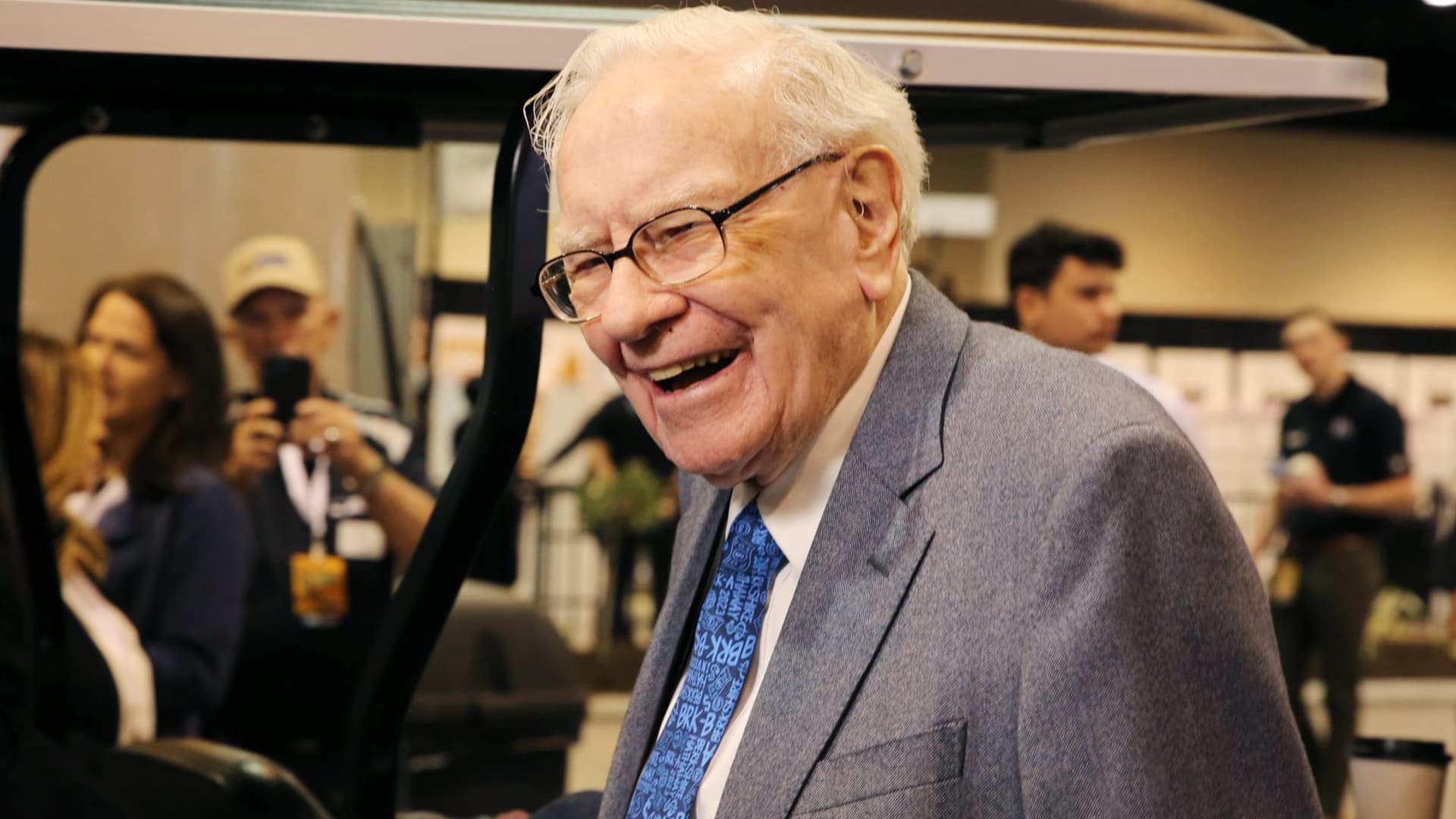Products You May Like
Berkshire Hathaway, led by legendary investor Warren Buffett, has been making a confidential wager on the financial industry since the third quarter of last year.
The identify of the stock — or stocks — that Berkshire has been snapping up could be revealed Saturday at the company’s annual shareholder meeting in Omaha, Nebraska.
That’s because unless Berkshire has been granted confidential treatment on the investment for a third quarter in a row, the stake will be disclosed in filings later this month. So the 93-year-old Berkshire CEO may decide to explain his rationale to the thousands of investors flocking to the gathering.
The bet, shrouded in mystery, has captivated Berkshire investors since it first appeared in disclosures late last year. At a time when Buffett has been a net seller of stocks and lamented a dearth of opportunities capable of “truly moving the needle at Berkshire,” he has apparently found something he likes — and in the financial realm no less.
That’s an area he has dialed back on in recent years over concerns about rising loan defaults. High interest rates have taken a toll on some financial players like regional U.S. banks, while making the yield on Berkshire’s cash pile in instruments like T-bills suddenly attractive.
“When you are the G.O.A.T. of investing, people are interested in what you think is good,” said Glenview Trust Co. Chief Investment Officer Bill Stone, using an acronym for Greatest of All Time. “What makes it even more exciting is that banks are in his circle of competence.”
Under Buffett, Berkshire has trounced the S&P 500 over nearly six decades with a 19.8% compounded annual gain, compared to the 10.2% yearly rise of the index.
Coverage note: The annual meeting will be exclusively broadcast on CNBC and livestreamed on CNBC.com. Our special coverage will begin Saturday at 9:30 a.m. ET.
Veiled bets
Berkshire requested anonymity for the trades because if the stock were known before the conglomerate finished building its position, others would plow into the stock as well, driving up the price, according to David Kass, a finance professor at the University of Maryland.
Buffett is said to control roughly 90% of Berkshire’s massive stock portfolio, leaving his deputies Todd Combs and Ted Weschler the rest, Kass said.
While investment disclosures give no clue as to what the stock could be, Stone, Kass and other Buffett watchers believe it is a multi-billion-dollar wager on a financial name.
That’s because the cost basis of banks, insurers and finance stocks owned by the company jumped by $3.59 billion in the second half of last year, the only category to increase, according to separate Berkshire filings.
At the same time, Berkshire exited financial names by dumping insurers Markel and Globe Life, leading investors to estimate that the wager could be as large as $4 billion or $5 billion through the end of 2023. It’s unknown whether that bet was on one company or spread over multiple firms in an industry.
Schwab or Morgan Stanley?
If it were a classic Buffett bet — a big stake in a single company — that stock would have to be a large one, with perhaps a $100 billion market capitalization. Holdings of at least 5% in publicly traded American companies trigger disclosure requirements.
Investors have been speculating for months about what the stock could be. Finance covers all manner of companies, from retail lenders to Wall Street brokers, payments companies and various sectors of insurance.
Charles Schwab or Morgan Stanley could fit the bill, according to James Shanahan, an Edward Jones analyst who covers banks and Berkshire Hathaway.
“Schwab was beaten down during the regional banking crisis last year, they had an issue where retail investors were trading out of cash into higher-yielding investments,” Shanahan said. “Nobody wanted to own that name last year, so Buffett could’ve bought as much as he wanted.”
Other names that have been circulated — JPMorgan Chase or BlackRock, for example, are possible, but may make less sense given valuations or business mix. Truist and other higher-quality regional banks might also fit Buffett’s parameters, as well as insurer AIG, Shanahan said, though their market capitalizations are smaller.
Buffett & banks
Berkshire has owned financial names for decades, and Buffett has stepped in to inject capital — and confidence — into the industry on multiple occasions.
Buffett served as CEO of a scandal-stricken Salomon Brothers in the early 1990s to help turn the company around. He pumped $5 billion into Goldman Sachs in 2008 and another $5 billion into Bank of America in 2011, ultimately becoming the latter’s largest shareholder.
But after loading up on lenders in 2018, from universal banks like JPMorgan to regional lenders like PNC Financial and US Bank, he deeply pared his exposure to the sector in 2020 on concerns that the coronavirus pandemic would punish the industry.
Since then, he and his deputies have mostly avoided adding to his finance stakes, besides modest positions in Citigroup and Capital One.
‘Fear is contagious’
Last May, Buffett told shareholders to expect more turbulence in banking. He said Berkshire could deploy more capital in the industry, if needed.
“The situation in banking is very similar to what it’s always been in banking, which is that fear is contagious,” Buffett said. “Historically, sometimes the fear was justified, sometimes it wasn’t.”
Wherever he placed his bet, the move will be seen as a boost to the company, perhaps even the sector, given Buffett’s track record of identifying value.
It’s unclear how long regulators will allow Berkshire to shield its moves.
“I’m hopeful he’ll reveal the name and talk about the strategy behind it,” Shanahan said. “The SEC’s patience can wear out, at some point it’ll look like Berkshire’s getting favorable treatment.”
— CNBC’s Yun Li contributed to this report
